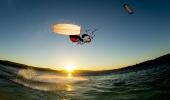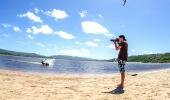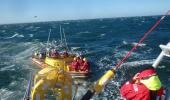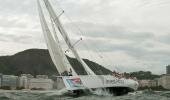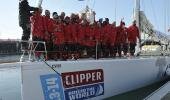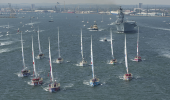Words: Tessa Melck | Photos: Courtesy of Tessa Melck
They say someone who is afraid of making mistakes never tries anything new or adventurous. I still don't know if this is true because like everyone, I try to avoid making mistakes. Yet, discovering the unknown and searching for adventure is what I crave, and therefore making mistakes should be my norm.
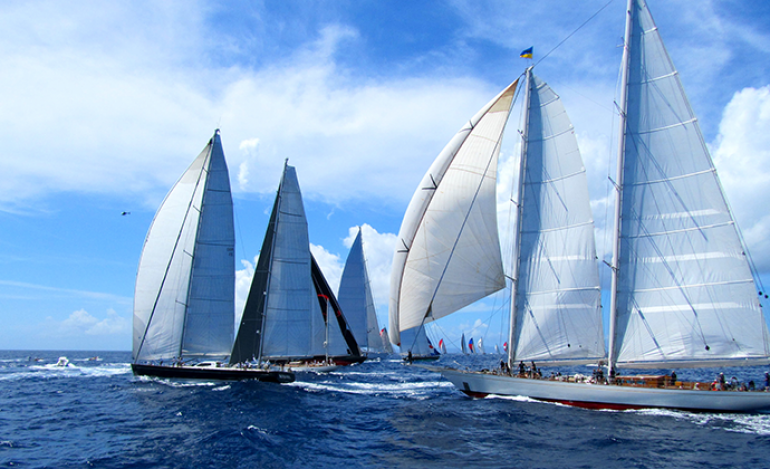
I grew up on our family farm, near Velddrift on the West Coast. My parents took over as the ninth generation of Melck owners and started a successful lodge and B&B, where paying guests arrived and left as friends. To us kids, hospitality or entertaining guests has always been a part of our upbringing. We were raised 'plaas' style: rough, tough and barefoot, with some continental European values, culture and education thrown into the mix.
I battled throughout school with dyslexia, but with persistence I graduated with unexpected good academic results. I was convinced that university was my only option. Destiny, however, had different plans! My sister, Nina, graduated as a chef from the Institute of Culinary Arts (ICA) some years earlier and decided to try out her sea legs, even though she had no boating experience. She sailed across the Atlantic Ocean to the Caribbean on a 40 ft Catamaran, as part of a crew of three. Once based in St. Maarten, Nina's career blossomed and she secured a full-time position on the classic yacht called Atlantide.
It all sounded so exciting, how could I not want to be a part of such an exciting industry? So in my gap year after school, I headed to the Caribbean island of St. Maarten. My career as a yachtie thus began at the age of 18, fresh out of school, sharing an apartment with a local up-and-coming band called Mellowism and sleeping on an old couch.
My biggest fear was not finding a job and being forced to return home after running out of money. However, luck was on my side and I got the opportunity to work onboard the super yacht SY Maltese Falcon, a magnificent 88 m sailing yacht with a remarkable freestanding computer-controlled clipper rig. During my time onboard, I was fortunate to visit amazing parts of the world, eat at the very best restaurants and receive VIP treatment at all the hottest clubs. As crew, we were not only surrounded by the very rich, famous and most influential individuals in the world, but lived a life of luxury. I watched the final lap of the Monaco Grand Prix from the top of the mast, whilst moored in Monte Carlo, before welcoming Bernie Ecclestone, the owner of the F1 Series onboard. I served famous F1 drivers their dinner, poured Richard Branson a virgin cocktail while anchored off his private island, sipped champagne with Georgio Armani in Antigua, argued South African politics with Bob Geldoff and watched Prince Harry zoom past on a jet ski in Barbados. These experiences were all part of the 'super' lifestyle the yachting industry exposed me to; a lifestyle where words like 'limits' and 'no' are seldom used.
Admittedly, my favourite time on the yachts was not when we were anchored off St. Tropez or in Ibiza with all the hottest bars and clubs eagerly waiting for the crews to come and spend their season tips. It was the opportunity to do an ocean crossing, because 'man cannot discover new oceans unless he has the courage to lose sight of the shore'. My first crossing was from Antigua to Palma de Mallorca onboard the SY Maltese Falcon. There is something incredible about being surrounded by nothing but the big blue for two weeks; when the only visitors are dolphins playing in the wake or curious whales breaching near the boat, and no land is in sight for miles. At night, the stars shine brighter than any city lights and you hear nothing but the sound of water rushing against the hull. Such is the beauty of sailing, but Johnny Depp, as Captain Jack Sparrow in Pirates of the Caribbean, says it best, “That's what a ship is, you know - it's not just a keel and a hull and a deck and sails, that's what a ship needs. But what a ship is, really is, is freedom.”
Whilst in Palma de Mallorca, my next big break came when an agency offered me a permanent position onboard a 45 m motor yacht. I immediately accepted, packed up my life in a rush and organised an early morning taxi to the airport. At the airport I sent a message to my parents: 'Got a job, off to Corsica to join a yacht, it’s a long flight, so don’t panic if I’m out of touch. Will contact you as soon as I’ve settled onboard'. My parents couldn't understand what I meant by 'a long flight' because Corsica is off the coast of France and Palma de Mallorca is at most a three-hour flight. Mid flight, the gentleman sitting next to me asked if I was also going to Costa Rica on holiday. My response was, “No, I’m actually going to Corsica to work on a yacht.” He was impressed, but looked confused and told me that this flight was Costa Rica bound. Nervously I called the stewardess and explained that I was on the wrong flight. She checked my flight details and said, “Your ticket is for Costa Rica, this is the correct flight.” So there I was on a plane heading to South America, almost the other side of the world! On arrival, I called home to tell my parents I'd arrived safely, not in Corsica as planned but rather in Costa Rica. It took my family a long time to see the funny side, as there were many occasions when my parents couldn’t keep track of their young 18-year-old daughter’s whereabouts.
Whenever I returned home and proudly regaled stories of my travels, most friends and family responded with, “What an adventurous lifestyle you lead.” My time abroad allowed for plenty of adventure and self-discovery, however life on a yacht is not always the glamorous lifestyle it appears to be. We would sail around the most beautiful Greek islands for weeks, but for me life was passing by through a porthole. There were times when there was no sunshine for days on end and I had no clue where we were. Although exciting at first, after a few years of constant change and being on the move, all I wanted was the stability and security of being land based. Living life in the 'super' lane also meant being far from home, missing out on special occasions and worst of all, the funerals of loved ones. I lost very dear friends - fellow yachties - two who drowned and one who got shot in the Caribbean. Every day reminded me to respect the ocean and that it’s a dangerous world out there. But we live and learn, for the yachting adventure continues.
After my gap year, I returned to Stellenbosch University to complete my degree in Politics, Philosophy and Economics. Every holiday I returned to the yachting community to earn some extra money and enjoy another adventure. I feel truly blessed to have lived life like a vagrant gypsy over the past few years within the super yacht industry, which has moulded me into the confident, capable young women that I am today. It has also taught me my most valuable lesson: Be who you are and say what you feel because those that matter don’t mind and those that mind don’t matter.
My passion for travel and endless self-discovery has encouraged me to leave the comfort of the yachts behind and challenge myself with another life-changing journey. I took on the Tour d’Afrique cycle challenge from Cairo to Cape Town in January, and if I can do it then so can you, because a dream remains a dream unless you make it your reality!
dinFO
Where to start
When starting out as a yachtie, it's compulsory for crew members to have an ENG 1 Medical Certificate, to prove fitness and health, as well as complete a short STCW 95 Course that covers the basics in first aid, fire fighting, sea survival and rescue. Crew members need to recognise the meaning of different alarms, as this can make all the difference to surviving a disaster at sea. Practising safety drills, whether for fire, man overboard or abandon ship are mandatory because rough seas, hurricane storms, finding a stowaway onboard or sailing through high-alert piracy waters are regular occurrences.
Having a foreign passport is a bonus, as the constant issuing of visas is an inconvenience Captains try to avoid. However, anyone with a passion for the seas should still to go for it.
There are plenty of online crew agencies that give beginner crew excellent advice. Research agencies online and if possible register with Bluewaters, Luxury Yachts, Crew Network, Elite Crew and Crew File.
Another suggestion is to go overseas to live amongst the yachts and meet the crew, who will become one’s best chance of landing a job. The most popular yachting hubs include Antibes, France; Palma de Mallorca, Barcelona; West Palm Beach, Fort Lauderdale; or the Caribbean islands of Antigua and St. Maarten.



